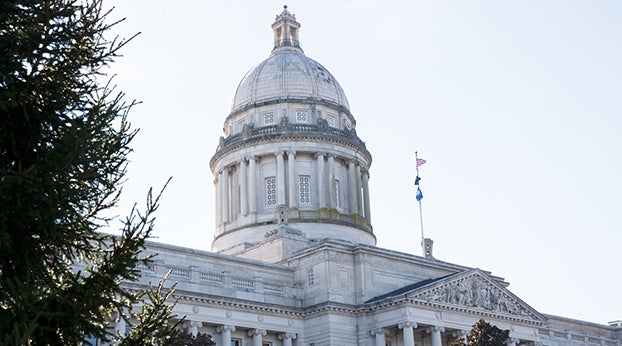Questions no one should have to ask
Published 6:27 pm Thursday, August 15, 2019
By ERIC MOUNT
Guest Columnist
Which restroom or locker room can I use? What health care can I count on receiving? What housing will accept me? What public accommodations will welcome me? What employers will consider me? Will military service be a possibility for me?
These are questions that people have had to ask for racial or ethnic reasons at times that we hope are past. For transgender people, however, such questions are not things of the past.
In towns such as Danville that have fairness ordinances, gender identity is included in statutory protections against discrimination, and it is good news to learn that there have been no formal complaints since our ordinance was passed in June 2014. However, when we hold recent surveys of public opinion up against recent discrimination statistics and governmental policy pronouncements, we find stark contradictions in our nation.
Let’s take the good news first. In a major win for transgender rights, the World Health Organization in June removed “gender identity disorder” from its global diagnostic manual, reclassified it as “gender incongruence,” and moved it from the mental disorders chapter to its coverage of sexual health. In May, the U. S. House of Representatives passed the Equality Act, which makes explicit the protections of transgender persons from discrimination in housing, employment and public accommodations. (The Senate won’t pass it, and the President won’t sign it, but it is a positive step.)
The results of a recent survey (April 9-20) by the Public Religion Research Institute are also largely encouraging — 62% of Americans, including evangelical Christians and Trump supporters, are more supportive of transgender rights than they were five years ago; and only 25% are more opposed. 76% of Democrats, 64% of independents and 47% of Republicans have become more supportive. Conservative Republicans at 40% are the only ideology with less than half reporting increased support. 64% of moderate/liberal Republicans are more supportive.
All regions of the country show increased support, with the Midwest the lowest at 57%. Majorities in every age group are more supportive, with 18-29 year olds at 68% and seniors (65 and over) at 56%. Majorities in every major religious grouping are more supportive, ranging from 68% of Catholics to 52% of white evangelical Protestants.
Regarding military service, in two years, Republicans have become more supportive, moving from 37% to 47%, while Democrats show negligible slippage from 83% to 76%. Trump supporters now register 47% for transgender people in the military as opposed to only 10% in 2017.
Only in support for religiously based refusal of service is there a slight shift in the other direction. It is a decided minority (3 of 10), but a slightly growing one in both parties over a five year period, that believes it should be permissible to deny service to gays, lesbians or transgender persons on religious grounds.
In only one respect does the PRRI survey reflect a decidedly negative prospect for transgender rights. 55% of Americans still believe that there are only two genders (43% strongly). 40%, on the other hand, believe there is a range of possible gender identities (meaning a person’s sense of one’s own gender, which can correlate with one’s own assigned sex at birth or differ from it). Democrats register 45% in the combination of belief and strong belief; Republicans register 73% between belief and strong belief about the gender numbers.
Now for the bad news (if one supports transgender rights). More than 780,000 people live in the 28 states that discriminate against transgender people. One in three LGBTQ persons report harassment and humiliation when seeking medical care. One in five transgender people have experienced homelessness at some point. One in five have experienced discrimination in seeking a home, and one in 10 have been evicted due to gender identity.
North Carolina remains the only state to pass — and now repeal — legislation restricting access to multiuser restrooms, locker rooms and other sex-segregated facilities; but 16 states, including Kentucky, have considered such legislation. Six states (not Kentucky) have considered legislation that would preempt municipal and county-level anti-discrimination laws.
President Trump has proposed regulations that would roll back LGBTQ rights and allow doctors, nurses and hospitals to discriminate based on false beliefs about gender and sexuality held on religious grounds. In May, the Department of Health and Human Services issued a proposal to exclude gender identity from anti-discrimination protections, remove recognition of federal law prohibiting discrimination against transgender patients, and allow providers to deny birth control, abortion, and gender-affirming treatment. It will be finalized only after a 60-day comment period (just ended) and additional review, but court challenges are sure to follow.
In 2015, President Trump announced a transgender ban for the military (where 15,000 transgender troops serve). The House voted to block the ban, and it currently applies only to new recruits. It went into effect in June.
“Transgender” is one of seven words that the Centers for Disease Control and Prevention is not to use. Federal prisons are to house people according to their sex at birth.
The Department of Housing and Urban Development announced in May that it is gutting regulations prohibiting discrimination against transgender people in homeless shelters and other government funded housing.
As of Feb. 18, the Department of Education may dismiss complaints based solely on gender identity.
As of Aug. 10, the Department of Labor will grant exemptions to federal contractors with religious objections to compliance with protections of transgender people against discrimination.
Such is the rolling back of gains for transgender citizens under the Obama administration.
Transgender people have made notable gains in support for their protections against discrimination in the court of public opinion, but in the current proposals and policies of governmental institutions and businesses, those questions that no one should have to ask remain relevant. Let’s hope that our commitment to fairness in Danville is up to the challenge.






